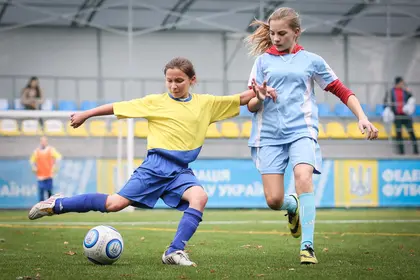To mark the United Nations’ International Day of the Girl Child on Oct. 11, Ukrainian girls took to a soccer pitch in Kyiv to break a gender stereotype.
The “EmPower Girls” soccer competition saw eight teams from all over Ukraine compete at the Viktor Bannikov stadium. Each team consisted of 10 girls aged between 10 to 13 years.
JOIN US ON TELEGRAM
Follow our coverage of the war on the @Kyivpost_official.
The event was organized by The United Nations Children’s Fund with the support of German government-owned development bank KfW and the Football Federation of Ukraine.
The organizers have picked soccer for the event because in many countries the sport is still male-dominated, with women facing the prejudiced view that they are too weak to play the game.
But Anastasia Sikorska, 12, a member of the Kyiv team that won the cup, said there is no difference between girls and boys.
“We’re all people, and we should make our dreams come true,” she told the Kyiv Post.
Sikorska said that she faces gender stereotypes at school. At physical education lessons, boys don’t want girls to join them to play soccer.
“They think that because we’re girls we should do embroidery,” Sikorska said.
Sikorska, who has just started playing soccer, said that although her father didn’t support her taking up this new hobby, she likes it, wants to play it, and would like to become a coach one day.
Laura Bill, the deputy representative in Ukraine of UN children’s organization UNICEF, said that event aimed to raise the awareness of the public and the authorities that gender stereotypes are still very common in Ukraine.
“(The event) is to help girls do what they like to do, and to be able to be independent of stereotypes and go for their dreams,” Bill said.
While teenagers sometimes face gender stereotypes at school and at home, younger girls are more free of them.
Anna and Daria Hlomozda, both 10, from Chernihiv, who also took part in the soccer competition, said they had heard that “playing like a girl” was supposed to be an insult, but they didn’t agree.
They said they liked to play soccer, and to try to develop new skills. When they decided to attend soccer trials in Chernihiv, they had no doubts that the sport was for them.
At school, they say, boys always ask questions about their hobby and enjoy playing soccer together with them.
“The boys congratulate us if we win. If we don’t, they cheer us up,” they said.
Strange combination
Apart from the competition for girls, the event’s organizers held a friendly match with well-known Ukrainians – eight women and eight men in two mixed-gender teams. The players were journalists, singers and professional football players.
Vira Diatel, 33, who plays for Ukraine’s women’s national soccer team, took part in the friendly match to support the development of women’s football in Ukraine.
She said that back in the early days when she decided to play football she was asked a lot about why she wanted to take up soccer.
“In our country, the combination of a girl and soccer is strange,” she said.
But Diatel didn’t let that put her off.
“All balls are round and we all run the same way,” she said. “Women love football too. Why can’t we play it? Why do they send us to the kitchen?”
Diatel used to play for the Spanish women’s team Sporting Club de Huelva and the Swedish club Linköping. She said that women’s football is popular there and she wishes it was the same in Ukraine.
“I wish we could popularize it so that girls can improve their skills and have good coaches,” she said. “Of course, we don’t feel there’s enough support and a lot of girls give up playing football.”
Lutz Hon-Hak, a representative of KfW, said that it was important to break stereotypes concerning which sports are appropriate for each gender.
“Sports gives young people an opportunity to come together, develop their personal and team working skills, and to gain confidence,” he said
He also said that the event was not only important in terms of sport.
“These girls playing here today learned to ignore these stereotypes and do what they wanted to do. So I hope that in future when they have to decide what to study, where to work, what position to aspire to, they will also feel this freedom and strength to decide to do what they want. This strength is not only important for themselves personally, but also important for the whole of society.”
You can also highlight the text and press Ctrl + Enter




